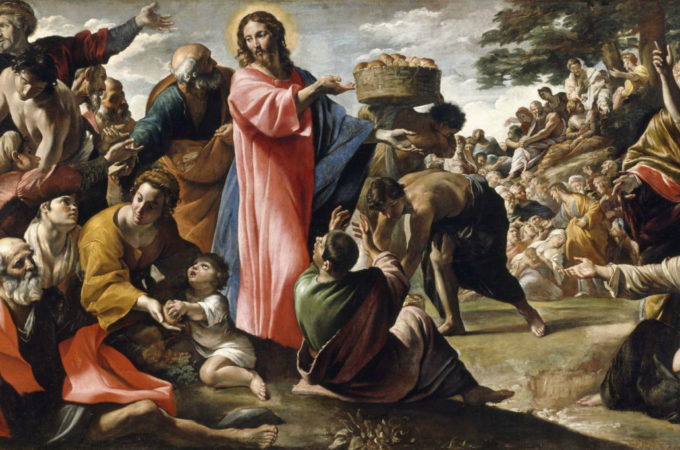Jesus feeds the multitude, as painted by Giovanni Lanfranco
God’s word is wonderful. Over the years I have come to see that it is inexhaustible in its breadth (it is the “owner’s manual”) and its depth (you can read the same passage hundreds of times over the years and always find new insights).
That is exactly what happened on a recent morning! I was reading John 6:1-15, the account of the miracle of the loaves and the fishes.
This is a narrative, like many of the biblical testimonies of Jesus performing miracles that show God’s power displayed through Jesus. When people saw Jesus perform a miracle, they recognized that Jesus was no ordinary man; he spoke and acted with authority. For many, his miracles provided an “aha” moment; their eyes were opened to see who Jesus really was, the Messiah, the Son of God. Jesus’ miracles, his parables and his life challenged long-held paradigms. This was no ordinary man. He was who he claimed to be: the Savior of the world.
Many who watched him create food before their very eyes became his followers: “After the people saw the sign Jesus performed, they began to say, ‘Surely this is the Prophet who is to come into the world,’” John 6:14.

Jesus’ first miracle—recorded in John 2:1-11—was turning water into wine at a wedding. Verse 11 speaks of the miracle’s meaning and the disciple’s response: “What Jesus did here in Cana of Galilee was the first of the signs through which he revealed his glory; and his disciples believed in him.” What did this miracle reveal? His glory! What did it provoke? His followers “believed in him!”
So yes, there was one primary reason for miracles: to show Christ’s power and glory and thus create an opportunity for people to believe in him.
Jesus modeled human development
Of course many other things are revealed in the narratives of Christ’s life. The story of feeding the 5000 reveals a biblical principle about human flourishing.
In John 6:2 a large crowd followed Jesus “because they saw the signs that he was doing on the sick.” Jesus’ healing of the sick established his power and authority in the eyes of the Galileans.
Seeing the great crowd and knowing they would need food, Jesus asked Philip, “Where are we to buy bread, so that these people may eat” (v 7). Jesus was testing Philip, who took the bait: “Two hundred denarii worth of bread would not be enough for each of them to get a little!”
Philip responded at the level of need. Five thousand people needed food. His paltry 200 denarii would not suffice. Philip’s eyes saw only the need. He started with the question What do they need?
In relief and development work, this is known as Need-Based Development (NBD). When you start with this question, people list their needs. This exercise creates expectations that these needs can only be met by outside help. A sense of dependency is reinforced, and in the end people are poorer than before.
But Jesus had something else in mind: “He said this to test him, for he himself knew what he would do” (v 6). Jesus was testing Philip, who responded by looking at the need and not at the resources.
Asset-Based Development starts with what you have
Andrew, on the other hand, saw something Philip missed: “There is a boy here who has five barley loaves and two fish, but what are they for so many?” John 6:9. Andrew sees resources, a little boy with loaves and fishes. This approach is at the heart of Asset-Based Development (ABD). Those serving among poor people who think in this way ask, not What do you need, but What assets do you have? This question challenges people to recognize what they have and how they might achieve their own development, beginning with what they have.
Jesus was about to perform a miracle to demonstrate his glory and power. And at the same time he was teaching valuable life lessons. Begin with what you have, not what you do not have. The boy had something. It was not much, five small loaves and two small fishes. Resources may be small, but they are resources nevertheless. Jesus turned these small offerings into food for 5000 people with 12 baskets of leftovers.
Notice another principle that Jesus taught here. After the crowd had eaten their fill, Jesus instructed the disciples, “Gather up the leftover fragments, that nothing may be lost” (v 12). He taught and modeled the principle of stewardship. The leftovers were not waste, they were resources for another time for other people.
A mind for development sees what is right in front of you. How do you see things that are “left over,” are they waste or are they resources?
Here is a short video clip that demonstrates how children, made in the image of God, transformed trash into beautiful music. If you have not yet seen this, take three minutes to watch the video:
What resources did these children start with? Their time, their built-in capacity for creativity and appreciation of beauty, and trash. These are resources if they are seen as such.
In addition to demonstrating His power and glory, Jesus wanted to teach some valuable lessons about human flourishing.
Learn to practice Asset-Based Development. See the resources in front of your eyes, and steward what you have been given by God.
And, don’t forget two of those resources right in front of you: your mind, and the Bible! Commit yourself to being a life-long learner!
- Darrow Miller






